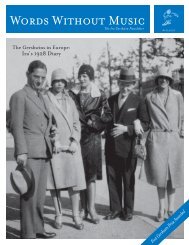Words Without Music - George and Ira Gershwin
Words Without Music - George and Ira Gershwin
Words Without Music - George and Ira Gershwin
Create successful ePaper yourself
Turn your PDF publications into a flip-book with our unique Google optimized e-Paper software.
PARK AVENUE FINDS ITS WAY TO LONDON<br />
More than 60 years after it closed<br />
on Broadway, Park Avenue made<br />
it across the pond for a short<br />
run this past spring as the opening<br />
production of the 2008 season of Ian<br />
Marshall Fisher’s Lost <strong>Music</strong>als organization.<br />
The cast of the London performances<br />
at the Lilian Baylis Theatre included<br />
Elizabeth Counsell, David Firth, John<br />
Rawnsley, Valerie Cutko <strong>and</strong> Nuala Willis.<br />
The production was “put across with great<br />
élan,” according to Michael Billington in<br />
The Guardian, who deemed it “an occasion<br />
for curio-collectors.” Billington also noted<br />
that “<strong>Ira</strong> <strong>Gershwin</strong>’s lyrics [in “There’s<br />
Nothing Like Marriage for People”] uncannily<br />
anticipate Sondheim’s ‘The Little Things You Do Together’<br />
from Company,” a point also made by Michael Darvell in his review<br />
at www.classicalsource.com. Prior to the London staging, the only<br />
production of Park Avenue since the original closed in January 1947<br />
was a short run at New York’s Theater Ten Ten in 1999.<br />
Coming off the unsuccessful Firebr<strong>and</strong> of Florence with Kurt<br />
Weill, <strong>Ira</strong> was approached by <strong>George</strong> S. Kaufman in late 1945;<br />
as he wrote to future <strong>Gershwin</strong> biographer, Edward Jablonski:<br />
“Am giving up the [motion] picture propositions to do a show<br />
with G.S. Kaufman <strong>and</strong> Nunnally Johnson – A. Schwartz to do<br />
the music.” Kaufman assured <strong>Ira</strong> “that [Park Avenue] will give<br />
you plenty of opportunity ...” <strong>and</strong> Arthur Schwartz, in a letter<br />
to <strong>Ira</strong> from the Waldorf-Astoria in January 1946, said he was<br />
“never so confident of a wonderful result.”<br />
Bringing together the talents of Kaufman, Johnson,<br />
Schwartz <strong>and</strong> <strong>Ira</strong>, this “smart” musical about a group of rich<br />
Long Isl<strong>and</strong>ers who switch marital partners too readily, seemed<br />
to have the elements for a success, but by the time <strong>Ira</strong> wrote to<br />
Jablonski on October 16, 1946 from the Warwick Hotel in<br />
Philadelphia (where he was staying during the show’s out of<br />
town run), the outlook wasn’t so rosy: “We’re still working hard<br />
trying to get it in first rate shape ... There’s a chance we’ll get by<br />
when we open in New York.”<br />
But that chance dimmed with the generally negative reviews<br />
that greeted Park Avenue after it opened on November 7, 1946,<br />
at New York’s Shubert Theatre. The show couldn’t overcome<br />
the critical brickbats (“singularly unimposing” – wrote Brooks<br />
Atkinson in The New York Times) <strong>and</strong> shut its doors after 72<br />
performances. Park Avenue’s backers, <strong>Ira</strong><br />
being one of them, suffered a loss of nearly<br />
$200,000. Unfortunately, as <strong>Ira</strong> put it in his<br />
book, Lyrics on Several Occasions, “… charm<br />
wasn’t enough … [<strong>and</strong>] divorce is a ticklish<br />
subject to be funny about for an entire<br />
show.” It seemed that jokes about<br />
divorce were particularly unfunny to families<br />
reuniting after the Second World War<br />
<strong>and</strong> at a time when shows such as Oklahoma!<br />
<strong>and</strong> Carousel had caught the imagination<br />
of the play-going public. <strong>Ira</strong> wrote,<br />
“Arthur Schwartz told me that a friend of<br />
his ... cried through most of it. She had recently<br />
been divorced <strong>and</strong> just couldn’t<br />
take it.” Schwartz conceded to <strong>Ira</strong> that<br />
“we didn’t deliver a show good enough to please the critics <strong>and</strong><br />
the customers.”<br />
Though <strong>George</strong> S. Kaufman, among others, asked him in<br />
later years to write for the stage again, Park Avenue was <strong>Ira</strong><br />
<strong>Gershwin</strong>’s last show on Broadway; as he expressed it to<br />
Edward Jablonski, “I can’t afford to do any more flops – two in a<br />
row is about six too many.” <strong>Ira</strong>’s lyrics would not find their way to<br />
Broadway again until 1983, when the Tony award-winning My One<br />
<strong>and</strong> Only opened three-<strong>and</strong>-a-half months before his death.<br />
Mary Wickes, Ruth Matteson, Arthur Margetson, Leonora Corbett <strong>and</strong> Wilson<br />
Smith in the original 1946 Broadway production<br />
The <strong>Ira</strong> <strong>Gershwin</strong> Newsletter 5





